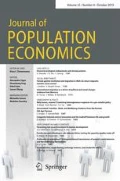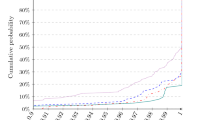Abstract.
In this paper, we test for the weak separability hypothesis imposed by the household production model between goods and time inputs used in the production of different commodities. Our data come from a French survey which reports both expenditures and time that households devote to some activities. The results allow us to show that the weak separability assumption cannot be rejected only when households are strongly time constrained. In the opposite case, home time uses are found to be nonseparable.
Similar content being viewed by others
Author information
Authors and Affiliations
Additional information
Received: 24 November 1999/Accepted: 16 November 2000
Rights and permissions
About this article
Cite this article
Lecocq, S. The allocation of time and goods in household activities: A test of separability. J Popul Econ 14, 585–597 (2001). https://doi.org/10.1007/s001480100084
Issue Date:
DOI: https://doi.org/10.1007/s001480100084




